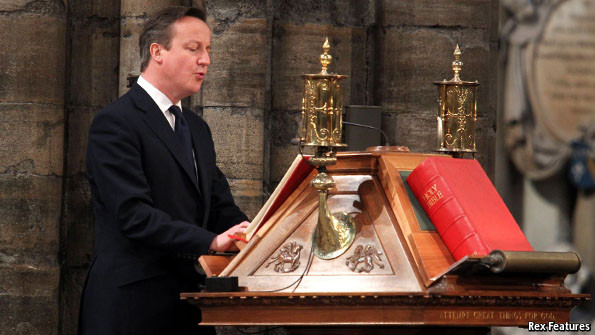
No stopping Justice Ruth Bader Ginsburg
April 23, 2014Australian Alex Oxford tells what living in Hong Kong is really like
April 23, 2014
ACCORDING to one American stereotype, Europe is somewhere on the road between lazy godlessness and mass conversion to Islam. Does it have any kernel of truth? This much is true: in most European countries there is no obvious equivalent of the American religious right in which a large standing constituency spoils for a fight over hard ethical issues. Those kinds of issues arise in Europe of course, but it is hard for European politicians to build a career by claiming the traditionalist ground; they would generally lose more votes than they would gain.
What does exist in Europe is the politics of identity, including religious identity. In this area Europe’s parties and politicians always think carefully about the signals they send and getting it right or wrong has consequences. That’s a helpful way to see David Cameron’s re-embrace of the Anglican church. In a column for the Church Times, he advocated “being more confident about our status as a Christian country” albeit without “doing down other faiths or passing judgement on those with no faith…” He carefully described himself as a “rather classic” member of the Church of England—”not that regular in attendance and a bit vague on some of the more difficult parts of the faith…” And in an Easter message he described the feast as “incredibly important”. His words were deplored by secularists (who probably wouldn’t vote for him anyway) and welcomed by Hindus and Muslims. Doubtless they will help him to retain some supporters attracted by the nativism of the UK Independence Party.
France’s President Francois Hollande has other calculations to make. Raised and educated in a Catholic world, he now professes atheism but in January he sought a meeting with Pope Francis, apparently with an eye to Catholic voters among whom he fares poorly. Almost all France’s Muslims voted for Mr Hollande; they were thanked with some token gestures such as the appointment of two women ministers from ethnic minority backgrounds who had resisted curbs on female headgear. But both ladies, like Mr Hollande, were strong supporters of same-sex marriage. Mr Hollande would enrage his own secularist constituency if he translated tokenism into substance.
In Germany, Chancellor Angela Merkel heads a Christian Democratic party, but she surprised many with her declaration of a hitherto private faith. A Lutheran minister’s daughter who grew up under communism, she said in November 2012: “I am a member of the evangelical church. I believe in God and religion is also my constant companion.” Whatever it says about her personal journey, the statement was seen a way of retaining hard-core conservative voters. But her brand of theo-conservatism does not prevent the party from fielding a sprinkling of Muslim candidates.
Italy’s young prime minister, Matteo Renzi, has yet to face any electoral contest, but presumably his party colleagues selected him, in part, because of his presentable image: a church-goer who spent his teenage years in a Catholic scout movement but has liberal views on civil rights for same-sex couples. The trick in European politics is to appeal to some religious and cultural constituencies without alienating others. Spain’s conservative prime minister Mariano Rajoy, who has pushed through curbs on abortion in the teeth of widespread opposition, is an outlier. For better or worse, most Europeans are not in the mood for a crusade. It must be their lazy godlessness.




